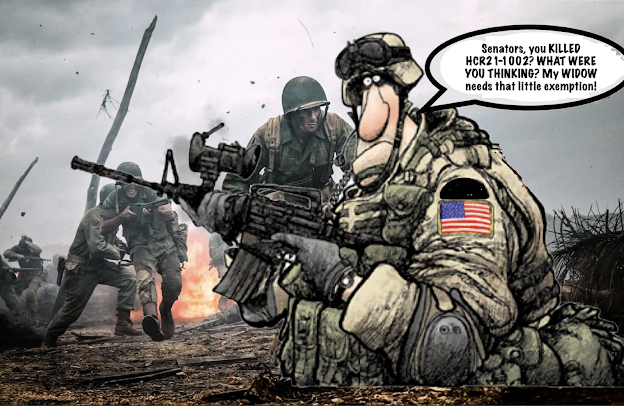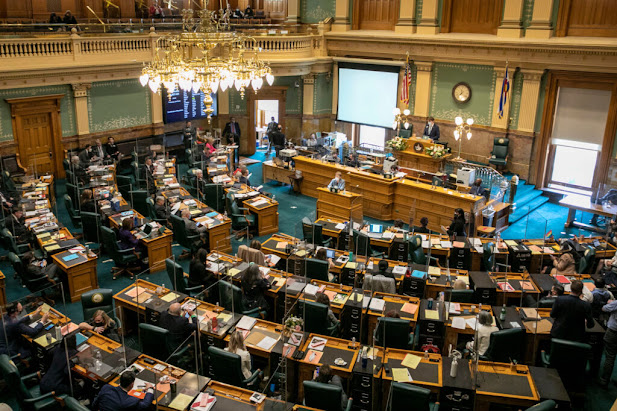 |
| June 7 2021: Colorado Senate killed Gold Star Wives bill for given survivors of totally disabled veterans (HCR21-1002 |

Colorado recognizes sacrifices of our totally disabled veterans, awarding a partial property tax exemption to 100 percent totally and permanently disabled veterans. The U.S. Department of Veterans Affairs has two types of 100% disabled veterans – (1) vets with a 100% disability (2) vets with a total disability rated “Total Disability for Individual Unemployability” (TDIU.) VA benefits for the two types are identical, but Colorado’s TDIU veterans are unfairly denied the exemption
Tuesday, June 15, 2021
COLORADO SENATE SNUBBED FAMILIES – KILLED GOLD STAR WIVES' PROPERTY TAX EXEMPTION
Monday, June 14, 2021
Colorado Voters Have a Long Memory - especially about how veterans and their survivors are treated
I believe Colorado's Democrat legislators have initiated the more important advances in veterans' benefits, but it would be wrong to conclude that either party is truly disinterested or uncaring. Democrats controlled the House and Senate in 2006 under a Republican governor and are together credited with getting Referendum E in front of the voters. There, the constitutional amendment found overwhelming support. This established the Disabled Veterans Property Tax Exemption in 2007 and reflected well on both parties.
Sunday, June 13, 2021
C-123 Veterans Association Joins Colorado's United Veterans Coalition
To better support state and federal veterans' issues, The C-123 Veterans Association has affiliated with Colorado's United Veterans Coalition (UVC.) UVC is the single most effective voice for over 350,000 veterans in Colorado. It brings together the VA and nearly every interested organization and political entity in the state.
RADM Dick Young USNR (Ret.) was elected president last week. UVC will celebrate is annual banquet on June 27 and tickets are still available.
How'd that Colorado Senate vote go for Gold Star Wives' property tax exemption?
June 7 2021: HOW DID COLORADO STATE SENATORS VOTE TO PERMIT GOLD STAR WIDOWS THE SAME PROPERTY TAX EXEMPTION COLORADO GIVES DISABLED VETS' WIDOWS? One Guess. | |||
| DEMOCRATS = 100% NO GOP = 100% YES Interesting. And very, very revealing. Every senator* who voted "YES" to honor our Gold Star Wives with SJR21-010 in May seemed to see things differently on June 7, and voted "NO" on HCR21-1002. Thumbs down on spending $93,000 to permit these 140 widows of active-duty troops same small partial property tax exemption Colorado now gives survivors of our 100% disabled veterans. Here are their empty words from SJR21-010 tossed to the wind, now shown to be useless and meaningless: "That we, the members of the Colorado General Assembly honor the pride and the pain of the parents and partners and children and siblings of our fallen heroes and recognize the families of these proud patriots with an expression of profound gratitude and respect." * voting no:
|
Saturday, June 12, 2021
COLORADO SENATE PRIORITIES FOR 2021 AND 2022
Genuine thanks are due the Colorado House of Representatives!
I must set aside my disappointment with the Colorado Senate Veterans Committee killing HCR21-1001 last week. The House is due a salute and my most sincere thanks for their amazing step of a unanimous vote approving HCR21-1001.
Thank you, Republicans and Democrats in the Colorado House of Representatives for your unanimous approval of HCR21-1002 that you forwarded to the Senate where others decided $93,000 was just too much to "honor" survivors of our servicemembers."...submitting to the registered electors of the state of Colorado an amendment to the Colorado constitution concerning the extension of the property tax exemption for qualifying seniors and disabled veterans to the Gold Star Spouses of deceased members of the United States Armed Forces. "
Gold Star Wives Are Due the Disabled Veteran Survivor Property Tax Exemption
 |
| Colorado proudly honors survivors of our totally disabled veterans...thousands of them, but ignores 140 equally worthy Gold Star Wives |
Friday, June 11, 2021
COLORADO SENATE DISHONORS ITS OWN RESOLUTION "HONORING" GOLD STAR FAMILIES
Right. Uh-huh. Fellow Coloradans, SJR21-010 wasn't worth the postage to mail it to the survivors. Neither was it enough of "an expression of profound gratitude and respect" to move the mighty senators to more carefully consider HCR21-1002. It certainly wasn't worth the esteemed committee of law-makers' bipartisan review. Instead, on a party-line vote, all Dems voted NO and the outnumbered Republicans voted YES.
1. sell the marital home and downsize
2. reduce housing costs to adjust to loss of spouse's income
 |
| SHAME |
exemptions just too, too much of a burden for the Great State of Colorado? No, not when we can also spend many millions on family planning for undocumented immigrants.
1. There are two types of Gold Star Wives. First, a small number of survivors of servicemembers whose deaths were in the line of duty while on active military service. This is the group proposed for the disabled veteran survivor property tax exemption.
Thursday, June 10, 2021
Helped My Old College Roommate With His VA Claim
 |
| Paul (L) and Wes, San Diego 1967 |
No Vet left behind. Ever.
Paul was supposed to be best man at my wedding at the March AFB chapel on June 14, 1969. Instead, he found himself headed off for Army basic training. While at Fort Bragg an incident on the rifle range left him totally deaf for days. He was seen at the base medical clinic but the damage was done: he gradually regained most of his hearing after a week of rest, but then year after year, the ears "rang" louder and louder as Paul's tinnitus developed. And so did his bilateral hearing loss worsen. A lot!
This was a half century ago. Specialist-5 Paul Hansen was a traditional Army reservist, serving his initial six months of Active-Duty, but without full-time active duty after that to qualifying him as a "veteran" per the law; nothing that would leave him eligible for VA care or any other benefits. Paul did his six year military obligation and began the rest of life's complicated journey in earnest.
 Paul moved between Tokyo and California while I bounced around the country with my civilian and military careers. Once, after I left the Army to fly for the California Air National Guard, I was able to take Paul on a flight with me to Massachusetts for his aunt's funeral. Because we kept in touch and visited occasionally plus weddings and funerals, I noticed Paul's advancing hearing loss and urged him to file a disability claim at the VA.
Paul moved between Tokyo and California while I bounced around the country with my civilian and military careers. Once, after I left the Army to fly for the California Air National Guard, I was able to take Paul on a flight with me to Massachusetts for his aunt's funeral. Because we kept in touch and visited occasionally plus weddings and funerals, I noticed Paul's advancing hearing loss and urged him to file a disability claim at the VA.
In fact, around 2014 I even filled out his VA claim for him! But Paul is the reigning world champion of procrastination; the application lay somewhere, ignored, then trashed or perhaps shuffled into some unrelated pile of documents never to be seen again. Okay, I'm a nag. Phone call after phone call, "how ya doin" was followed by reminding him to file with the VA. It never happened.
Paul's hearing loss was significant, but the real goal was for him to establish veteran status with VA. This would entitle him to hearing aids but also vital health care for a multitude of other problems. The disability compensation of his claim was an insignificant concern – in poor health, twice-widowed and living alone, Paul needed the wide range of VA benefits due disabled veterans but he'd never be a veteran, much less a disabled veteran, without getting around to submitting his claim.
It got to the point that we both realized a claim just wasn't going to get done in our lifetime or before the sun burned out. With Paul's permission I used his power of attorney and applied to the VA for tinnitus and hearing loss disabilities. The initial obstacle of getting Paul to file finally accomplished, we next moved to finding proof of his Army rifle range problem. I filed a request with the Army's personnel records center in St. Louis and the vital proof of injury medical records were promptly sent to us.
Then there had to be an effective argument that even though he was a traditional Reservist over fifty years back, Paul's injury should entitle him VA care and benefits. Usually VA will only consider problems a year after discharge, probably not Paul and more than half a century later! Paul wasn't even a statutory veteran per the law because he'd never been on active duty after basic training.
I have a medical background and I also remembered a key detail: The law provides that Reservists and National Guard troops, if they have a disabling injury during their training, the requirements for full veteran status are met. Further, because Paul's training was during the Vietnam War he'd have a wider range of important coverages as a wartime veteran – but only if he succeeded in his claim.
I also wrote a lengthy report about the Army's poor history of troops' hearing injuries in the years before earplugs were even permitted on a rifle range. I quoted similar VA disability claims from other veterans who won their claims, even years later like Paul. Because of Paul's age and health, his claim needed to be approved on our first pass, not rejected for correction or appeal. Too often, claims have flaws that delay the process a year or even longer for an appeal. At best, we hoped that Paul would get a small 10% disability award for his tinnitus and hearing loss but also worried about any delays for this increasingly frail man.
This week, VA notified him it approved the claim on the initial application. Paul Hansen thus became our newest honored disabled veteran. 40% disabled, not just 10% as first hoped. Two other major health issues are still under consideration and we're hoping it will put Paul over 50% disability, at which point all his medical care is provided free. Other benefits he can get now:
- Benefits for Veterans 40-50% Disabled, plus compensation
- Preventive care.
- "Level 2" VA medical priority group
- Inpatient (hospitalization) services.
- Military PX and commissary use.
- Care in the Community
- Ancillary services.
- Mental health care.
- Geriatrics and extended care.
- Medical equipment/prosthetic items and aids.
- Old age, low income pension (income-based.)
- Medical travel.
- Veteran-Directed Care program, a budget to help with activities of daily life.
- Medication/supplies
The VA decision on his application also made his disability retroactive to December 2020, the date VA received his claim. Paul, faced with many health issues, is finally entitled to VA hearing aids and so many other benefits. Paul isn't poor but the VA check will be useful.
California has some property tax exemptions and other benefits, mostly kicking in at a 100% disability. We'll have to see if Paul's remaining issues are going to be service-connected.
Here, I'll take a firm grasp on myself and control the urge to tell Paul what his disability checks would have totaled (over $35,000) if HE'D ONLY DONE AS I SUGGESTED SEVEN YEARS AGO. I've helped vets with their VA claims but just one other went back over half a century like Paul's. That was for Bob Edwards, church friend and former Navy officer for whom we got a total disability based on World War II injuries 63 years earlier.
A note: Paul's dad's Coast Guard leather bridge coat (he's wearing it in the top photo) saved my life, quite literally, sometime around 1967 in Riverside, California. But that's another story.












